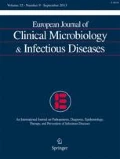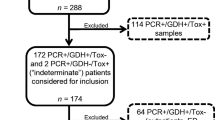Abstract
Polymerase chain reaction (PCR) for the diagnosis of Clostridium difficile infection (CDI) might result in overdiagnosis. The clinical outcomes of symptomatic CDI patients diagnosed by PCR remain uncertain. We aimed to determine whether patients whose diagnosis of CDI was based on PCR had different characteristics and clinical outcomes than those diagnosed by toxin immunoassay. Consecutive CDI patients, hospitalized at Rabin Medical Center, Beilinson Hospital, Petah Tikva, Israel, between January 2013 and January 2016, were identified retrospectively and included in the study. Diagnosis of CDI was based on PCR or diagnosis by immunoassay for C. difficile toxin. The main outcome was 30- and 90-day all-cause mortality. The PCR group included 165 patients and the immunoassay group included 157 patients. In comparison to the immunoassay group, patients in the PCR group were more likely to be younger, to be independent, to undergo previous abdominal surgery, and to use laxatives. The 30-day mortality rate in the PCR group was significantly lower than that in the immunoassay group, 29/165 (18%) vs 49/157 (31%), respectively; p = 0.028. On multivariate analysis, PCR diagnosis was associated with reduced mortality, OR 0.48 (95% CI 0.26–0.88). PCR-based diagnosis of CDI is associated with reduced all-cause mortality rates. Further studies are needed to determine the management of patients with discrepant immunoassay and PCR diagnosis of CDI.
Similar content being viewed by others
References
Davies KA, Longshaw CM, Davis GL et al (2014) Underdiagnosis of Clostridium difficile across Europe: the European, multicentre, prospective, biannual, point-prevalence study of Clostridium difficile infection in hospitalised patients with diarrhoea (EUCLID). Lancet Infect Dis 14:1208–1219
Zilberberg MD, Shorr AF, Kollef MH (2008) Increase in adult Clostridium difficile-related hospitalizations and case-fatality rate, United States, 2000-2005. Emerg Infect Dis 14:929–931
Kang J, Sickbert-Bennett EE, Brown VM, Weber DJ, Rutala WA (2014) Changes in the incidence of health care-associated pathogens at a university hospital from 2005 to 2011. Am J Infect Control 42:770–775
Cheng JW, Xiao M, Kudinha T et al (2015) The role of glutamate dehydrogenase (GDH) testing assay in the diagnosis of Clostridium difficile infections: a high sensitive screening test and an essential step in the proposed laboratory diagnosis workflow for developing countries like China. PLoS One 10:e0144604
Swindells J, Brenwald N, Reading N, Oppenheim B (2010) Evaluation of diagnostic tests for Clostridium difficile infection. J Clin Microbiol 48:606–608
Longtin Y, Trottier S, Brochu G et al (2013) Impact of the type of diagnostic assay on Clostridium difficile infection and complication rates in a mandatory reporting program. Clin Infect Dis: Off Publ Infect Dis Soc Am 56:67–73
Planche TD, Davies KA, Coen PG et al (2013) Differences in outcome according to Clostridium difficile testing method: a prospective multicentre diagnostic validation study of C difficile infection. Lancet Infect Dis 13:936–945
Berry N, Sewell B, Jafri S et al (2014) Real-time polymerase chain reaction correlates well with clinical diagnosis of Clostridium difficile infection. J Hospital Infect 87:109–114
Guerrero DM, Chou C, Jury LA, Nerandzic MM, Cadnum JC, Donskey CJ. Clinical and infection control implications of Clostridium difficile infection with negative enzyme immunoassay for toxin. Clin Infect Dis : Off Publ Infect Dis Soc Am 2011;53:287–290
Kaltsas A, Simon M, Unruh LH et al (2012) Clinical and laboratory characteristics of Clostridium difficile infection in patients with discordant diagnostic test results. J Clin Microbiol 50:1303–1307
Polage CR, Gyorke CE, Kennedy MA et al (2015) Overdiagnosis of Clostridium difficile infection in the molecular test era. JAMA Intern Med 175:1792–1801
Baker I, Leeming JP, Reynolds R, Ibrahim I, Darley E (2013) Clinical relevance of a positive molecular test in the diagnosis of Clostridium difficile infection. J Hospital Infect 84:311–315
Lungulescu OA, Cao W, Gatskevich E, Tlhabano L, Stratidis JG (2011) CSI: a severity index for Clostridium difficile infection at the time of admission. J Hospital Infect 79:151–154
Polage CR, Solnick JV, Cohen SH (2012) Nosocomial diarrhea: evaluation and treatment of causes other than Clostridium difficile. Clin Infect Dis : Off Publ Infect Dis Soc Am 55:982–989
Author information
Authors and Affiliations
Corresponding author
Ethics declarations
Conflict of interest
The authors declare that they have no conflict of interest.
Ethical approval
The study was approved by the institutional research ethics committee of Rabin Medical Center.
Informed consent
The committee waived the need for informed consent.
Rights and permissions
About this article
Cite this article
Avni, T., Babich, T., Ben-Zvi, H. et al. Molecular-based diagnosis of Clostridium difficile infection is associated with reduced mortality. Eur J Clin Microbiol Infect Dis 37, 1137–1142 (2018). https://doi.org/10.1007/s10096-018-3228-4
Received:
Accepted:
Published:
Issue Date:
DOI: https://doi.org/10.1007/s10096-018-3228-4



